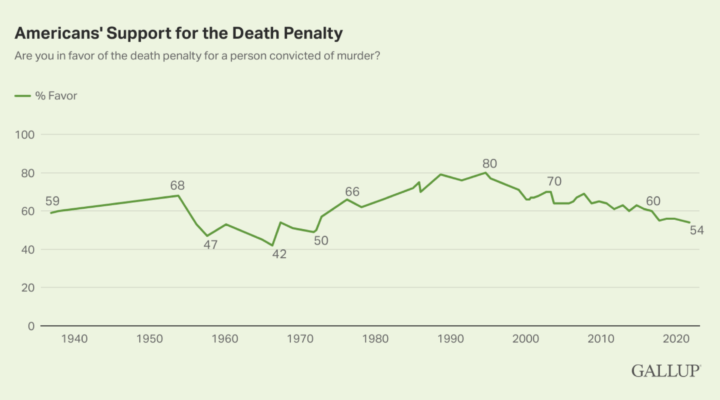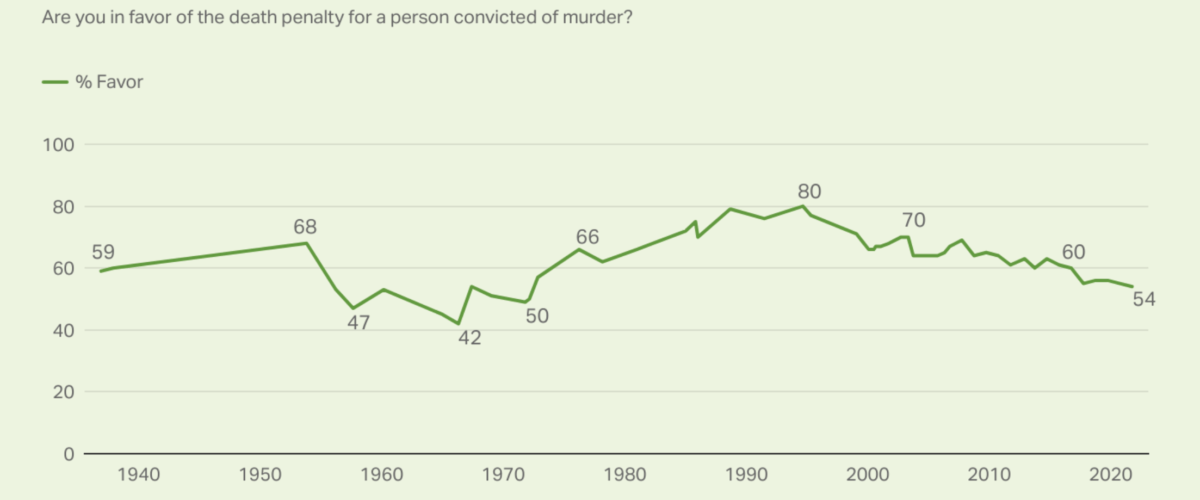New research has documented Americans’ continued low support for capital punishment just as an anti-death penalty campaign ramps up in Ohio, conservatives in Oklahoma worry the practice could be endangered in their state, and the U.S. Supreme Court prepares to weigh in on the religious rights of condemned prisoners.
Gallup’s latest crime survey found that 54% of Americans support state executions of murder convicts, which is well below the 80% approval in 1994 and the lowest since the 50% recorded in 1972.
The poll was conducted Oct. 1-19 and released about a month later amid a flurry of developments related to capital punishment.
Activists, including Conservatives Concerned about the Death Penalty, and the Evangelical Network of Equal Justice USA, have joined with Ohioans Against Executions to campaign for passage of pending legislation that would abolish capital punishment in the Buckeye state.
A 2020 survey reported that a majority of Ohioans (59%) want capital punishment replaced with the sentence of life without the possibility of parole. Bipartisan bills in the state House and Senate have been introduced to do just that.
In a Nov. 10 livestreamed event titled “Why the Death Penalty is Dying,” the campaign sought to sway evangelicals against capital punishment.

Demetrius Minor
“I never want to get to a point in my life where I think I can play the role of God, to where I can say someone’s actions can be grounds for them to be … exterminated,” said Demetrius Minor, national manager of Conservatives Concerned About the Death Penalty.
In an online statement, the Evangelical Network of Equal Justice USA underscored the Christian foundation for death penalty opposition. “We are evangelicals and we recognize that every person is created in the image of God, and therefore all life has immeasurable value. We believe that our justice system should reflect this truth, and that every individual should be treated with respect and dignity.”
Gallup said the robust support executions enjoyed in the mid-1990s resulted from an era when Americans identified crime as the biggest danger facing the nation, while the recent decline in support can be pinned to awareness of the inhumane shortcomings of the practice.
“In recent decades, there has been renewed concern about the administration of the death penalty as new evidence has exonerated some death-row inmates and led to some states issuing a moratorium on executions or abolishing the death penalty.”

Rep. Jim Olsen
Oklahoma may be on the way to such an outcome — at least that’s the fear of Republican state Rep. Jim Olsen after the commutation of one death sentence, the recommendation of clemency for another prisoner, the delay of other executions due to complications with lethal injection drugs and a looming federal lawsuit challenging the state’s execution practices.
“This is probably the end of the death penalty in the state of Oklahoma,” Olsen, a supporter of the death penalty, recently told the Associated Press.
Oklahoma Gov. Jim Stitt on Nov. 18 commuted the death sentence of former NFL running back Julius Jones to life in prison without parole.
Earlier that week, the state parole board recommended clemency for another prisoner due to concerns about lethal injection procedures in the wake of the October execution of John Marion Grant, who experienced severe convulsions attributed to one of the drugs used in his killing.
The commutation and delays followed a six-year moratorium on executions in Oklahoma because of previously bungled injections. The delays are a worrisome development for those who support capital punishment, Olsen told AP.
“I was hopeful that it was, yes, and I say that for my desire for the state, for the good of the law-abiding people of the state of Oklahoma,” he said. “I think it gives us a more permissive climate to commit murder.”
Olsen stopped short of criticizing Stitt for his handling of the Jones case. “It’s obviously a very difficult position to be in. I don’t think anyone would say, ’I wish I was the governor and had to decide this.’”
Death penalty advocates and opponents also are watching the U.S. Supreme Court for an expected decision about the religious rights of condemned prisoners.
Justices heard arguments Nov. 9 in the case of Texas Death Row inmate John Ramirez, whose request to have his pastor present at his execution was denied by prison officials. The high court put a number of other Texas executions on hold until it decides if and to what extent spiritual advisers may be present during executions.
The ongoing developments in Ohio, Oklahoma and Texas follow a victorious anti-death penalty effort in Virginia.
The ongoing developments in Ohio, Oklahoma and Texas follow a victorious anti-death penalty effort in Virginia, which in March became the 23rd and latest state to abolish capital punishment in March.
That effort also relied heavily on religious organizations and faith leaders to press lawmakers to approve legislation to put a halt to executions.
“I would advise any other state to look to the faith community” for support in opposing capital punishment, one of the Virginia campaign organizers said during a webinar hosted by Baptist News Global. “It’s powerful when you hear a preacher, especially an African American preacher, talk about this legacy of lynching and talk about injustice and the disproportionate number of African Americans who have been killed.”
Related articles:
Ending capital punishment in Ohio should be a ‘pro-life’ ideal, evangelical speakers declare
The death penalty is dying a slow death; it’s time we pull the plug | Analysis by Stephen Reeves


